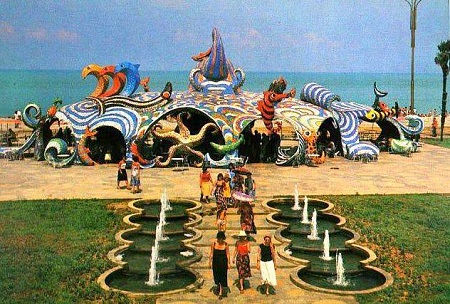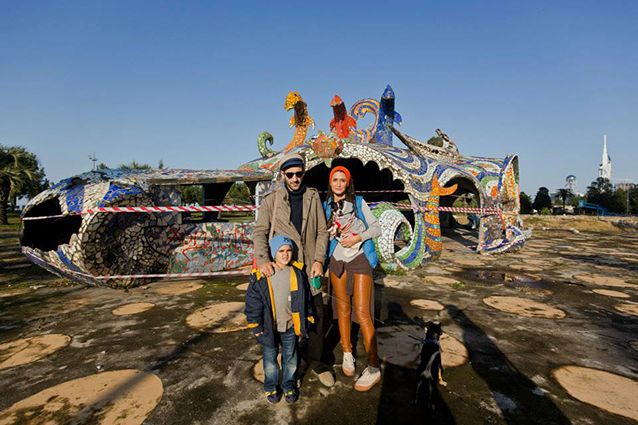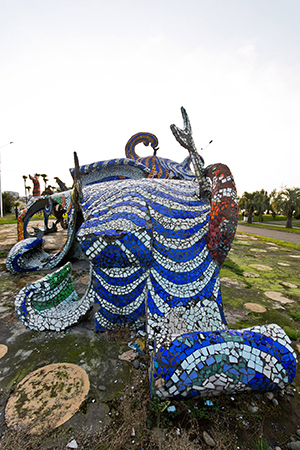Iconic Batumi “octopus” cafe given new lease of life

An iconic building in Georgia’s seaside city Batumi will be restored to its former glory after city authorities decided to include the colourful Soviet-built former cafe in their beach area development plan.
The former Cafe Fantasia – known among the locals as The Octopus due to its original shape – will be returned to its original function as a cafe, albeit in new surroundings planned in the Batumi Boulevard Development Concept, local channel Ajara TV reported on Wednesday.
Built in 1975, the cafe was an attractive local spot until 2000 when the cafe was shut down and abandoned. Neglect of the building resulted in damage to the building’s structure and deterioration of its surrounding area.
Construction works by the nearby Hilton Batumi Hotel to redevelop the area around the former cafe raised fears among locals that the unique building could be demolished to make space for other purposes.
In November last year local activists launched an online petition to safeguard the Soviet-era building, while a group of citizen activists protested against its possible destruction by wrapping the building in tape and leaving their fingerprints under the slogan I Defend the Octopus.

Community members wrapped the building in tape to protest the possible destruction of the iconic building. Photo by Cafe Fantasia community/Facebook.
A follow-up statement by Hilton Hotel management in December said dismantling the construction was not in their plans however the building’s fate still hung in the balance as it was not regarded as a cultural heritage monument.
There were also doubts about the technical possibility of restoring the neglected construction before its inclusion in the Batumi Boulevard Development Plan after an expert study showed the building could be safely restored on the historic spot.
The wish of the locals to see the object preserved was enough for authorities and related offices to review the possibility and carry out a technical feasibility study,” Adjara Cultural Heritage Protection Agency director Miranda Charkviani told Ajara TV.
The new plan for the former cafe included creating new spaces around and beneath it, while also transforming the building back into a cafe.
It will function as a cafe with a pool built around [it] and a square set up next to the pool. Beneath the location an underground space will be created for exhibiting highlights of Adjara,” the region’s Supreme Council member Akaki Dzneladze told reporters.
Several local community members said they still had doubts about the final fate of the building, claiming only the status of cultural heritage monument would ensure its long-term safety but also acknowledging the effects of their efforts so far in ensuring the building was saved from imminent demolishing.
Only by having a formal status guaranteeing its preservation would mean [the building] is saved … It was thanks to efforts of Batumi residents as well as many people unrelated to Batumi – those who gathered to protest last year – that the authorities heard their voices,” Batumi Community member Shota Gujabidze said while commented on the struggle to restore the cafe building.

The building featured colourful mosaic illustrations of sea animals and scenes. Photo by Cafe Fantasia community/Facebook.
The Cafe Fantasia was built in 1975 by acclaimed Georgian architect Giorgi Chakhava – author of the internationally recognised former building of the Georgian Ministry of Automobile Roads in Tbilisi - and Merited Painter of Georgia Professor Zurab Kapanadze of the Tbilisi State Academy of Arts.
The cafe became a popular spot for Batumi locals and tourists as a place for buying coffee, ice cream and drinks in the boulevard. But it was the construction and artistic qualities of the building that made it unique.
The structure of the building was created using special rods bent into complex shapes by hand, before the shapes were filled with a purposely-developed liquid glass material.
The outer layer of the cafe was adorned with shapes and mosaic illustrations of sea animals and seaside scenes, featuring a uniquely colourful palette in the era of functional and monochrome Soviet architectural style.
The review of the new Batumi Boulevard Development Plan is scheduled for May 2016.
 Tweet
Tweet  Share
Share